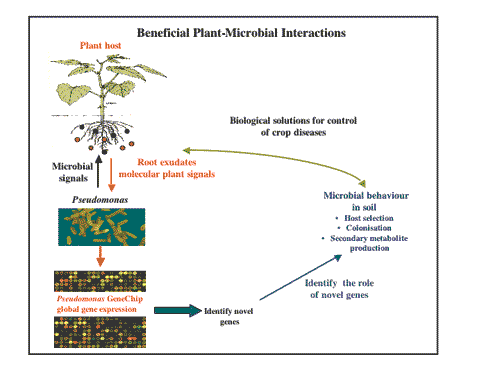| 2004 |

|
YEAR BOOK |
University College Cork
|
Understanding communication between plants and microbes; benefits for sustainable agriculture
|
The Biomerit Research Centre (BRC), directed by Professor Fergal O'Gara and located in the Microbiology Department and Biosciences Institute at UCC, has a well-established modern environmental microbial genomics research programme. Economically devastating crop diseases, such as root rot, damping off, and take-all, are currently controlled, at least in part, by the application of chemical fungicides as seed coatings or liquid formulations. There is, however, a growing desire for alternatives to chemical applications, and this comes from two perspectives: (1) protection of the environment and (2) human health considerations.

However, despite the successful performance of these microbial strains in greenhouse trials, consistent, effective biocontrol in diverse field environments remains a problem. Limitations could be due to a variety of factors, e.g., the inability of the microbial strain to compete and survive on the plant root and/or low production of secondary metabolites.
The rhizosphere is defined as the soil closely adhered to the plant root, and the molecular signals exuded by the root can select for a particular type of microbial population in this niche. Advances in bacterial genomics have made inroads into trying to understand the complex molecular signalling and regulatory mechanisms that exist in these beneficial plant-microbial interactions in the rhizosphere. Despite this, little is still known about the role these systems play in promoting both (1) microbial survival in different niches and, (2) beneficial plant-microbial interactions in the soil.
In our research programme, functional genomics based on an integrated systems biology approach is being used to study the influence of molecular signals exuded by the plant root on Pseudomonas gene expression using GeneChip technology. The objective of the research is to identify novel genes that may be important in defining the bacteria's ability to successfully compete with other microbial communities in the rhizosphere, an essential trait for efficient biocontrol. Ultimately, by understanding beneficial plant-microbial interactions in the rhizosphere, this research will help provide realistic biological solutions for the control of economically devastating crop diseases.
Contact: Prof. Fergal O'Gara, Director BIOMERIT Research Centre, Professor of Microbiology,
Microbiology Department, National University of Ireland, Cork (UCC);
E-mail: [email protected]